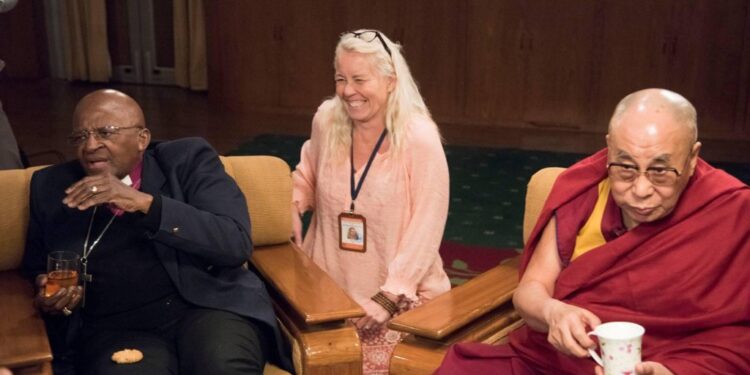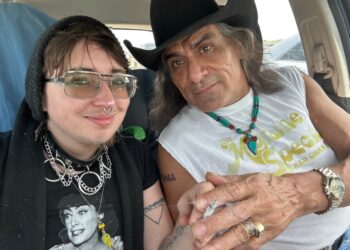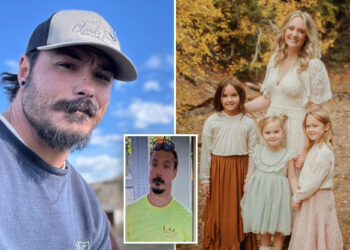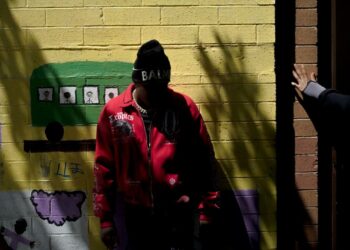As a 41-year-old mom of four, Lara Love Hardin knew all the secrets of motherhood: The best snacks to quiet a hangry horde before basketball practice. The telltale wiggle showed a toddler needed the restroom ASAP.
She also knew the best parking lots to scour for unlocked cars, where she could steal credit cards from other well-heeled moms doing private school drop-off in Aptos, in the suburbs of Santa Cruz, Calif.
“Moms always leave their purses in unlocked cars at private schools,” Hardin writes in “The Many Lives of Mama Love” (Simon & Schuster), out now.
The memoir details how Hardin rose from opiate-addicted inmate to literary powerhouse, known for ghostwriting best-selling memoirs by luminaries like the late Archbishop Desmond Tutu and the Dalai Lama.
It’s a story of redemption that Hardin hopes resonates with people who have also reached rock bottom.
“I think everyone has something they’re ashamed of,” Hardin told the Post.


Hardin’s own rock bottom came when one of the parents she stole from reported their credit card missing.
Hardin and her then-husband, DJ, a former mortgage broker she had met in recovery, had used the card to hole up in a hotel for a heroin binge.
On the surface, Hardin’s fall from soccer mom to junkie was shocking.
But Hardin had been hiding addiction since her twenties when she developed a Vicodin habit.


She had gone to recovery and embraced sobriety, and had even developed a copacetic co-parenting relationship with her ex-husband, Bryan.
She thought the relationship with DJ was a second chance for both of them: he wanted a “nice, boring life” after 3 DUIs and rehab. So did Hardin.
The pair went into business, launching a pet cemetery, blended their five children, and bought a $1 million home in a leafy cul-de-sac.
Their lives were a sober series of cookouts, middle school sports practice, and kids tussling in their backyard.

But after the birth of their son, Kaden, their lives took a dark turn. When Kaden was 2 months old, DJ went to rehab — unsuccessfully — for a heroin habit. Hardin turned back to pills.
Both tried to hide their addictions. But when Kaden was 2, Hardin asked DJ to share his heroin. Heroin, Hardin writes, gave her “everything she ever wanted — peace, joy, escape.”
With heroin, she felt like any problem she had — the unpaid mortgage, the unpaid school fees, the stolen credit cards jammed in the dresser drawers — could be fixed tomorrow.

“Tomorrow” became Hardin’s mantra. It was what allowed her to imagine a life in which she wasn’t salivating over the golf-ball size lump of heroin held by her husband.
Then came the night in 2007 when the police busted into the seedy hotel room, ending the couple’s drug binge.
Escorted to the police station, her clothes hanging off her barely 100-pound frame, she realized that tomorrow wasn’t an option.

She cried as she begged an officer to tell her where Kaden was. “He’s better off without you. You should not be anyone’s mother,” the cop said.
“There’s a clock on the wall—it’s 2 am. I wonder where Kaden is sleeping. A cold terror engulfs me. I have to get out of here. I have to get him,” Hardin writes of her first night in jail.
Accused of 32 felonies, Hardin faced 27 years in prison — the local paper called the couple “Neighbors from Hell” — and was awaiting trial in county jail.
But county jail saved her life. It started when she “Daddy,” the unofficial ruler of Cell Block G. When Daddy, a squat woman with a buzzcut, was tussling with another inmate, Elena, Hardin stepped in.

She pulled Daddy, red-faced and seething, aside and said: “If you rage at Elena, you give her power over you … you have to create cognitive dissonance. Do the unexpected thing and she’ll do something different.”
Daddy nodded. She stopped raging and instead, silently stared at Elena until Elena pulled the panic button and begged the guards to move her to another unit.
“Eventually, Daddy brings me her court and legal papers and we talk over options and prison,” Hardin writes. “The minute the unit sees Daddy deferring to me, a peaceful transition of power happens… my opinion is always the final word.”

Hardin became “Mama Love,” doling out counsel, wisdom, and rule enforcement. This power gave Hardin opportunities. Not only did she get first dibs on any inmate’s stash of commissary snacks, but it gives Hardin a place to use her “mother energy.”
“I listen. Empathize… and like any good mother, I lead with compassion. But all it takes is one look to bring the miscreants in line,” she writes. Those who don’t fall in line get “rolled up,” and forced to ask prison guards to transfer them to another unit.
To Hardin, jail is a class system with a power structure that is somewhere between a teen sleepover and “Lord of the Flies.”

Furniture is made from tampon boxes; Snickers bars are currency. Lara quickly climbed the social ladder with a mixture of love and healing to other inmates, to become the “shot caller,” showing that jailhouse politics aren’t that different from the PTA meetings she used to attend.
But if jail seemed like summer camp sometimes, when the differences popped up, they were stark.
For one, Hardin had to contend with the “kites” (contraband messages) from DJ, who was also in county jail.
These kites addressed Hardin as “homegirl” — and often contained a baggie of meth, which Hardin, desperate to stay clean, flushed down the toilet.

Bored in their cells between Christmas and New Year, she and Daddy hatched a plan for Leah, one of the pregnant inmates, to fake going into labor.
In the break from the monotony of prison life, the inmates would be able to ogle paramedics.
But the second part of the scheme was no laughing matter: Daddy had drug dealers visit Leah during her fake labor, to bring back narcotics.
Situations like these reminded Hardin how high the stakes of staying sober were — and that prison is anything but a PTA gathering.

Outside, her family was fractured.
Her three teen sons were with Bryan and his new wife. But 3-year-old Kaden was in limbo.
While he was being allowed to stay with Bryan’s family, his future was controlled by Child Protective Services.
After 10 months, Hardin was able to make a plea deal that included her county jail time, five years probation, and $19,000 in restitution: she was free.

But her story was just beginning. She had to get a job.
She had to find a place to live.
And she had to avoid breaking probation, which was nearly impossible.
On one of Hardin’s first days out, her probation officer received a call that she had been spotted driving past her son’s daycare, which would have broken CPS requirements — and breaking them could mean losing custody of him forever.

The call was a lie, but the terror she felt while it was investigated was real.
“Even with the privilege that comes from being white, from being educated, from having some support, it was almost impossible not to go back to jail, and it was terrifying,” said Hardin.
A Craigslist post led to a position as an admin assistant at Idea Architects, a literary agency founded by powerhouse agent and author Doug Abrams.
During the interview, Hardin spoke of her creative writing background and her stint running a pet cemetery with DJ. Her jail time never came up — and she got the job.

Several days later, Abrams called her. He had been tipped off to her past by a neighbor and asked her to come and talk with him.
“Driving back there the next day was one of the hardest things I had to do,” says Hardin. “I was flooded with shame, and I was so disappointed. But I hadn’t lied. And that was really important to me to be able to say that.”
Abrams kept her on, and Hardin’s responsibilities grew to encompass representing A-list clients and ghostwriting for them.

But she kept quiet in public about her past — until 2019, when she took a stand-up comedy class and told a group of strangers: “So, this one time when I was in prison…”
She told the Post: “I was so afraid of people finding out I was the ‘neighbor from hell.’ But once I began telling people, I felt such giddiness and lightness that I wanted more of that.”
That led to her writing the memoir.
“I take responsibility for my crimes and the pain I caused people. And I feel like I did my time, I paid my restitution, I completed my probation and I kept myself in shame and silence for at least a decade after,” said Hardin.

Hardin welcomes comparisons to other prison memoirs, such as “Orange Is the New Black.”
“Memoirs are a great way to have understanding, if not empathy, of incarcerated people. So I’m hoping it ends some of the biases and judgments that the world has about prison.”
She’s also launched a nonprofit, The Gemma Project, which provides programs and services for women in the California Bay Area.

And Hardin has also reconciled with her family.
She’s been married to her third husband, Sam, for over a decade and lives in La Selva Beach, CA with five dogs, three cats, and twenty-something chickens.
“My oldest son said, ‘Mom, I’ve always been close to you. But I feel closer to you now,” Hardin recalled. “That meant a lot.”
And Hardin, who has now opened a literary agency called True Literary, has found the written word to truly be one of the things that saved her life and gave her back her family.
“When I was addicted to opiates, I stopped writing and I also stopped thinking.”



























